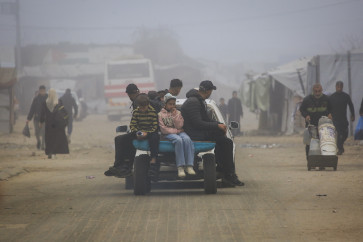Popular Reads
Top Results
Can't find what you're looking for?
View all search resultsPopular Reads
Top Results
Can't find what you're looking for?
View all search resultsEditorial: Water scarcity
As many Jakartans begin to feel the effects of the water shortage, particularly during the dry season, authorities would do well to prepare against a widespread crisis
Change text size
Gift Premium Articles
to Anyone
As many Jakartans begin to feel the effects of the water shortage, particularly during the dry season, authorities would do well to prepare against a widespread crisis.
Plans by the Jakarta city administration to drastically increase groundwater fees is seen as an early step toward better management of water resources.
But this is like a drop in the ocean, so to speak.
The planned hike will increase the current groundwater fees by up to 600 percent. For instance, the current price for large industries of Rp 3,000 (33 US cents) per cubic meter will increase to Rp 16,000, an official from the city's mining agency said.
Meanwhile, two water operators impose rates of Rp 5,932 per cubic meter on average.
Under this policy, Jakartans -- particularly businesses and industries -- are encouraged to rely on tap water. But this will require tap water operators to be able to meet consumers' demands.
Groundwater is the only ready-to-use water source for Jakartans. Our potentially huge resources -- the 13 rivers crisscrossing the capital -- can hardly be used, as their heavy pollution leads to high treatment costs.
Worse, natural water conservation is not possible because of the limited green and open spaces in the city. With a major part of the land covered by concrete, for houses and other urban infrastructure, most of the rainwater flows straight to the sea and does not contribute to our groundwater.
Currently, some half of the city's clean water supply comes from Jatiluhur dam in West Java, some 80 kilometers from the city. It is channeled through West Tarum Barat canal into water treatment facilities owned by the two existing water operators, PT PAM Lyonnaise Jaya (Palyja) and PT Thames PAM Jaya (TPJ).
Every dry season, many households cry out for clean water because supply is short for as many as 12 million residents and commuters. Meanwhile, manufacturers, offices, hotels and other businesses are forced to pump out as much groundwater as possible to meet their needs.
Overexploitation of groundwater has in turn sparked further water scarcity. Jakarta has been reported to be sinking in a number of places, and groundwater has suffered from intrusion from seawater.
The poor are hit hardest, having to spend more to buy water when the groundwater runs out.
But necessity is the mother of invention.
Singapore, with its increased capacity for water treatment and recycling, can now boast a much lower dependence on Malaysia for its lifeline.
Jakarta needs to look more closely at the possibilities for creating more sustainable water resources. Authorities are fully aware they need not look far: there are the old, perhaps neglected, programs.
There used to be requirements for all houses and buildings to have reservoirs to catch rainwater. Other items on the to-do list were the Clean River Program (Prokasih) and the development of deep tunnels to channel the large amounts of water needed as a source for tap water operators.
To send out the message that rivers are not dumping grounds, the programs were launched with much fanfare. The sitting environment minister would periodically cruise boats amid river garbage. We hear little of such programs today -- not because they were not feasible, but because they lacked commitment from residents and the city leaders in implementing them.
River cleaning, for one, would not cost that much if townspeople stopped treating their rivers as their garbage dumps.
If the programs launched in the 1980s had been successful, then by now the city would have its own enormous water resources, which would have greatly complemented supply from water operators.
It's high time to invest, to avert the need for even more funds in the water-scarce future.










